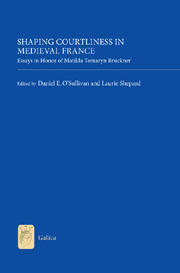Book contents
- Frontmatter
- Contents
- List of Illustrations
- Acknowledgements
- Introduction
- Matilda Tomaryn Bruckner: A Bibliography
- Part I Shaping Real and Fictive Courts
- Part II Shaping Courtly Narrative
- Meraugis de Portlesguez and the Limits of Courtliness
- The Art of “Transmutation” in the Burgundian Prose Cligés (1454): Bringing the Siege of Windsor Castle to Life for the Court of Philip the Good
- Thomas's Raisun: Désir, Vouloir, Pouvoir
- Humanimals: The Future of Courtliness in the Conte du Papegau
- A Matter of Life or Death: Fecundity and Sterility in Marie de 139 France's Guigemar
- Le Roman de la Rose, Performed in Court
- Part III Shaping Women's Voices in Medieval France
- Part IV Shaping the Courtly Other
- Envoi
- List of Contributors
- Index
- Tabula Gratulatoria
- Already Published
Humanimals: The Future of Courtliness in the Conte du Papegau
from Part II - Shaping Courtly Narrative
Published online by Cambridge University Press: 05 May 2013
- Frontmatter
- Contents
- List of Illustrations
- Acknowledgements
- Introduction
- Matilda Tomaryn Bruckner: A Bibliography
- Part I Shaping Real and Fictive Courts
- Part II Shaping Courtly Narrative
- Meraugis de Portlesguez and the Limits of Courtliness
- The Art of “Transmutation” in the Burgundian Prose Cligés (1454): Bringing the Siege of Windsor Castle to Life for the Court of Philip the Good
- Thomas's Raisun: Désir, Vouloir, Pouvoir
- Humanimals: The Future of Courtliness in the Conte du Papegau
- A Matter of Life or Death: Fecundity and Sterility in Marie de 139 France's Guigemar
- Le Roman de la Rose, Performed in Court
- Part III Shaping Women's Voices in Medieval France
- Part IV Shaping the Courtly Other
- Envoi
- List of Contributors
- Index
- Tabula Gratulatoria
- Already Published
Summary
When I chose the Conte du Papegau as the focus of my essay for this volume, I did not realize I was following a tradition. The Papegau figures among the studies given to Hans-Erich Keller in 1993, Douglas Kelly in 1994, and Karl Uitti in 2000. Since the authors of these dedicatory essays are Norris Lacy, Jane Taylor, and Lori Walters, I feel that I am in excellent company. Something in this atypical Arthurian romance may make it particularly fit for celebrating the works and career of a colleague, mentor, and friend. I therefore propose to transform an unspoken nascent practice into the custom that all future Festschrift offered to a specialist of French medieval literature include a study on the Papegau.
For Gaston Paris, the Conte du Papegau was a conte à dormir debout. The expression implies that if a story induces you to fall asleep on the spot, it is not because the story is deadly dull but because it is as absurd, inconsistent, and implausible as a dream. Modern scholars would agree with Paris about the oniric quality of the Papegau, but after Freud, Jung, and surrealism, it is difficult to reject a work of art under the pretext that it feels like a dream.
- Type
- Chapter
- Information
- Shaping Courtliness in Medieval FranceEssays in Honor of Matilda Tomaryn Bruckner, pp. 123 - 138Publisher: Boydell & BrewerPrint publication year: 2013



